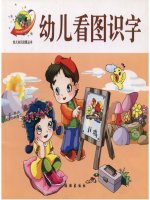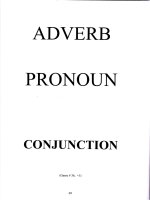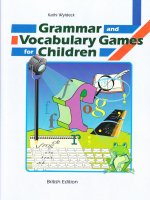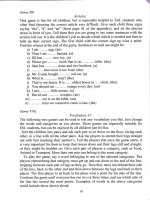quick thinking games riddles for children
Bạn đang xem bản rút gọn của tài liệu. Xem và tải ngay bản đầy đủ của tài liệu tại đây (8.02 MB, 147 trang )
This page intentionally left blank
101 Quick-Thinking Games +
Riddles for Children
Books from Hunter House
101 Music Games for Children by Jerry Storms
101 More Music Games for Children by Jerry Storms
101 Dance Games for Children by Paul Rooyackers
101 More Dance Games for Children by Paul Rooyackers
101 Drama Games for Children by Paul Rooyackers
101 More Drama Games for Children by Paul Rooyackers
101 Movement Games for Children by Huberta Wiertsema
101 Language Games for Children by Paul Rooyackers
101 Improv Games for Children and Adults by Bob Bedore
Yoga Games for Children by Danielle Bersma and Marjoke Visscher
The Yoga Adventure for Children by Helen Purperhart
101 Life Skills Games for Children by Bernie Badegruber
101 More Life Skills Games for Children by Bernie Badegruber
101 Cool Pool Games for Children by Kim Rodomista
101 Family Vacation Games by Shando Varda
404 Deskside Activities for Energetic Kids by Barbara Davis, MS, MFA
101 Relaxation Games for Children by Allison Bartl
101 Quick-Thinking Games + Riddles for Children by Allison Bartl
101 Pep-Up Games for Children by Allison Bartl
The Yoga Zoo Adventure by Helen Purperhart
Ordering
Trade bookstores in the U.S. and Canada please contact:
Publishers Group West
1700 Fourth St., Berkeley CA 94710
Phone: (800) 788-3123 Fax: (510) 528-3444
Hunter House books are available at bulk discounts for textbook course adoptions;
to qualifying community, health-care, and government organizations;
and for special promotions and fund-raising. For details please contact:
Special Sales Department
Hunter House Inc., PO Box 2914, Alameda CA 94501-0914
Phone: (510) 865-5282 Fax: (510) 865-4295
E-mail:
Individuals can order our books from most bookstores,
by calling (800) 266-5592, or from our website at
www.hunterhouse.com
1
0
1
Quick-Thinking
Games + Riddles
for Children
A Hunter House Book
Allison Bartl
Illustrations by Klaus Puth
Copyright © Cornelsen Verlag Scriptor GmbH & Co. KG, Berlin 2004
Translation © 2008 Hunter House Publishers
First published in Germany in 2004 by Cornelsen as
Schnelldenker-Spiele für Grundschulkinder
All rights reserved. No part of this publication may be reproduced or transmitted
in any form or by any means, electronic or mechanical, including photocopying and
recording, or introduced into any information storage and retrieval system without the
written permission of the copyright owner and the publisher of this book. Brief quotations
may be used in reviews prepared for inclusion in a magazine, newspaper, or for broadcast.
For further information please contact:
Hunter House Inc., Publishers
PO Box 2914
Alameda CA 94501-0914
Library of Congress Cataloging-in-Publication Data
Bartl, Almuth.
[Schnelldenker-spiele für Grundschulkinder. English]
101 quick-thinking games + riddles for children / Allison Bartl.
p. cm. — (SmartFun activity books)
Includes index.
Translation of: Schnelldenker-spiele für Grundschulkinder.
ISBN-13: 978-0-89793-497-8 (pbk.)
ISBN-10: 0-89793-497-0 (pbk.)
ISBN-13: 978-0-89793-498-5 (spiral bound)
ISBN-10: 0-89793-498-9 (spiral bound)
1. Games. 2. School children—Recreation. I. Title. II. Title: One hundred
and one quick-thinking games + riddles for children.
GV1203.B36413 2007
649'.55—dc22 2007034426
Project Credits
Cover Design: Jil Weil & Stefanie Gold
Illustrations: Klaus Puth
Book Production: John McKercher
Translator: Emily Banwell
Copy Editor: Kelley Blewster
Proofreader: Herman Leung
Acquisitions Editor: Jeanne Brondino
Editor: Alexandra Mummery
Senior Marketing Associate: Reina Santana
Publicity Assistant: Alexi Ueltzen
Rights Coordinator: Candace Groskreutz
Order Fulfillment: Washul Lakdhon
Customer Service Manager:
Christina Sverdrup
Administrator: Theresa Nelson
Computer Support: Peter Eichelberger
Publisher: Kiran S. Rana
Printed and Bound by Bang Printing, Brainerd, Minnesota
Manufactured in the United States of America
9 8 7 6 5 4 3 2 1 First Edition 08 09 10 11 12
101 Quick-Thinking Games + Riddles for Children v
Contents
Introduction 1
Why Quick-Thinking Games? 1
Key to the Icons Used in the Games . . . . . . . . . . . . . . . . . . . . . . . . . . . . . . 2
The Games and Riddles 4
The Games 4
The Riddles 110
Alphabetical List of Games 12 7
Games with Special Requirements 12 9
Games Requiring Props
Games in Which Physical Contact Might Be Involved
Games Requiring a Large Space
Games Requiring Going Outdoors
A detailed list of the games indicating appropriate group sizes
begins on the next page.
vi 101 Quick-Thinking Games + Riddles for Children
List of Games
Page Game
Whole group
Any size group
Small groups
Pairs
4 Quick Lineup c
5 Good Listeners
c
6 “Math Chair” Race
c
7 What’s My Job?
c
8 Word Transformation
c
9 Letter Switcharoo
c
10 Guessing Letters
c
11 Just the Opposite
c
12 Athletic Letters
c
13 The Bean-Counting Game c
14 Meeting c
15 Fairy-Tale Quiz
c
16 Short Words
c
17 Short Words, Long Sentences
c
18 A Different Kind of Math Chain
c
19 What’s in Common?
c
20 All Funny Kids Plant Umbrellas
c
22 Room Change c
23 Race to 30
c
24 Proverbs
c
25 Minute Lists
c
26 What’s for Dinner?
c
27 Letter Puzzle
c
28 Making Pairs
c
29 Different Uses
c
101 Quick-Thinking Games + Riddles for Children vii
Page Game
Whole group
Any size group
Small groups
Pairs
30 Clapping Songs c
31 A Place to Stand
c
32 Rhyming Journeys
c
33 The Number-Croaking Frog
c
34 How Many Stars in the Sky?
c
36 Playing-Card Concentration
c
37 Similarities
c
38 Nonsense
c
39 Tommy Traps the Texan Trout
c
40 Lowest Number c
41 Voice Memory
c
42 Where’s the Candy?
c
43 The Surprise Box
c
44 One-Legged Letters
c
45 Quick Neighbors
c
46 Counting Letters
c
47 Famous People
c
48 Stand Up!
c
49 Stand-Up Words
c
50 Double Trouble
c
51 Good Neighbors
c
52 Ping-Pong Words
c
53 Transcription
c
54 Fuzzlewug
c
55 Headless Mother
c
56 Mystery Object c
57 Walking Around the Square
c
58 Damp Letters
c
59 Locked In
c
60 At Your Fingertips
c
61 Name Jumble
c
62 Meaningful Names
c
viii 101 Quick-Thinking Games + Riddles for Children
Page Game
Whole group
Any size group
Small groups
Pairs
63 Single-Syllable Auction c
64 Multiplication Race
c
66 Dreamland
c
67 Math Bingo
c
68 Dice Roll-Off
c
69 Forward and Backward
c
70 Words in a Square
c
71 The Alphabet-Shift Code
c
73 The Bell-and-Whistle Multiplication Table
c
74 The Extraterrestrial Multiplication Table
c
75 Alphabetical Categories
c
76 Beep!
c
77 Alphabet Substitute c
78 Word Pyramid
c
79 Verb Dice
c
80 In-Between Words
c
81 Sports Quiz
c
82 Sports Homonyms
c
83 Counting or Measuring?
c
85 Remainder Lotto
c
86 Alphabetical Words
c
87 Same Beginning, Same Ending
c
88 Word Race
c
89 Pass the Story
c
90 What’s Next?
c
91 Estimation
c
92 Thingy
c
93 Riddles
c
94 Time Guesses
c
95 Crossword Puzzle
c
96 Work Clothes
c
97 Clock-Face Puzzle
c
101 Quick-Thinking Games + Riddles for Children ix
Page Game
Whole group
Any size group
Small groups
Pairs
98 Endless Jokes c
99 Number Miracle
c
100 Eighteen in a Square
c
101 Letter Hide-and-Seek
c
102 Novelties
c
103 Missing Consonants
c
104 The Vowel-Consonant Game
c
105 Dice Bingo
c
106 Reading Lips c
107 Knocking and Clapping
c
108 Ghost Journey
c
109 Mystery Letter
c
x 101 Quick-Thinking Games + Riddles for Children
List of Riddles
1 The Pants-Pocket Problem 110
2 Day by Day 110
3 Animal Riddle 110
4 Guessing Game 110
5 Apartment-House Mouse 111
6 5 5 5 5 5 111
7 Directions 111
8 Vacation Driving 111
9 From 1 to 10 111
10 Alphabetical Months 111
11 New Order 112
12 Welcome to the Club! 112
13 Polar Bear Birthday 112
14 The Carrot Quirk 113
15 Beary Hungry 113
16 Weekday Riddle 113
17 In the Hospital 113
18 Ice-Cream Scoops 114
19 In the Ice Cream Parlor 114
20 Boomerang 114
21 Riddle Bears 115
22 Cookie Problem 115
23 Uncles, Aunts, and Other Relatives 115
24 In Pairs 116
25 Time Problem 116
26 Sixty-Five Cents 116
27 Snail-Shell Settlement 116
28 At the Movies 117
29 In-Between Numbers 117
30 Birthday on Mars 117
31 Seven Dwarfs 118
Number Riddle Page
101 Quick-Thinking Games + Riddles for Children xi
32 A Dog and His Master 118
33 Month by Month 118
34 Arithmetic Acrobatics 118
35 Salad Days 119
36 Counting Ears 119
37 Penguin Head Count 119
38 Distance 120
39 Extraterrestrial Money Problems 120
40 Extraterrestrial Time Problems 120
41 Addendum 121
42 Mother and Daughter 121
43 Baker’s Math 121
44 Flag Lesson 121
45 Secret Language 122
46 Musical Quick Thinkers 122
47 How Time Flies 122
48 Mischief-Maker 122
49 Dice Math I 123
50 Dice Math II 123
51 Dice Odds 123
52 Tennis Tournament 123
53 Geese and Goats 123
54 Letter Puzzle 124
55 Snail Race 124
56 Mother’s Day 125
57 Mirror Letters 125
58 Birth Year 125
59 The Brilliant Sister 125
60 Heavyweight 125
61 Logical Letter Lists 126
62 Think about It! 126
63 Bus Route 126
64 Two Digits 126
65 Around the Sun 126
Number Riddle Page
Introduction
There are few activities that engage people as completely as games do. When
children play, they forget about the world. Once completely absorbed, they are
indifferent to any kind of evaluation criteria, and to any mishaps or frustrations
they may have experienced through their weaknesses. This not only alleviates
existing deficits, but also increases self-confidence, which in turn is a corner-
stone of successful learning.
Why Quick-Thinking Games?
These quick-thinking games and riddles encourage concentration, reasoning,
patience, an understanding of numbers, the use of logic, and working with let-
ters and words. They enhance memory skills. They help to develop social abilities
and teamwork. They can be used anytime and are great for substitute teachers,
free time, and enhancing math or English lessons; they provide a meaningful
activity for nearly every learning situation. All the games, exercises, puzzles,
and riddles included in this book can easily be modified to suit the needs of the
different elementary-school grades.
Numbers are an exciting phenomenon. They encourage children to experi-
ment, and they can be related to every aspect of life. The world becomes easier
to grasp when children are able to count and calculate. The ability to calculate
numbers means having power and being able to formulate things, and children
quickly understand this. When they play with numbers, they increase their abil-
ity to focus calmly on a problem for a length of time and to think in a solution-
oriented way. They improve their calculation skills and confidence, and many
children who have problems in math class lose their shyness when playing num-
ber games, suddenly understanding the rules and having fun with them. This
allows them to have successes that in turn motivate them in math class.
Logic is particularly important for the later acquisition of mathematical
skills. Numbers are placed in relation to one another, calculation patterns are
recognized, and ratios are determined. A number of games offered in this book
help children move toward a structured way of thinking; after all, a clear over-
view is the first step toward a clear understanding!
As an accompaniment to the systematic approach to reading and writing
taught in schools, this book offers a number of suggestions for fun and playful
approaches to looking at letters and words: Looking for letters, writing without
2 101 Quick-Thinking Games + Riddles for Children
a writing implement, rhyming words—even if the result is sometimes just fun
nonsense.
Children’s achievements, as we know, are not solely dependent on their in-
telligence, but also on how the work is presented. Here, concentration and pa-
tience play an important role. Someone who is distracted easily loses track of
what’s going on, and may be unable to finish a task, or finishes it only with dif-
ficulty. A lack of focus is often the cause of bad grades and behavioral problems.
Concentration problems are often related to a lack of interest, levels of difficulty
that are too high or too low, sensory overload, emotional problems, lack of physi-
cal well-being, or poor working conditions—just to name a few. These activities
provide a number of different ways to increase children’s concentration through
games and riddles.
Overall, the encouragement of team spirit and social behaviors stands
in the foreground of this book. Children should be able to see their school as a
place associated with positive feelings, something these activities promote.
The basis of every successful beloved children’s game is fun for all partici-
pants. So go ahead and play, laugh, and be goofy with your students; do some-
thing completely unexpected for once. Laughter unites people, no matter what
may be weighing on their minds. It loosens things up and is the key to every
child’s heart.
Key to the Icons Used in the Games
These games, riddles, and puzzles can be used with groups of children anytime,
as pick-me-ups or to fill in breaks. When applicable, solutions are provided im-
mediately after the game or riddle. The degree of difficulty increases through-
out the book. Games and/or tasks for six-year-olds, for instance, can be found
toward the beginning, while those for ten-year-olds are closer to the end. How-
ever, almost all the games can easily be adapted for any age. An alphabetical
list of all the games and tasks can be found in the back of the book.
To help you find activities suitable for a particular situation, each one is
coded with symbols or icons that tell you some things about it at a glance:
The size of the group needed•
If props are required•
If a large space is needed•
If physical contact is or might be involved•
If the activity involves going outdoors•
These are explained in more detail below.
The size of the group needed. Most of the games can be played by the whole
group, but a few require pairs or small groups. (And some that are marked for
101 Quick-Thinking Games + Riddles for Children 3
the whole group can be adapted for small groups or pairs. Feel free to use your
imagination.) All games are marked with one of the following icons:
= The whole group plays together
= The children play individually, so any size group can play
= The children play in small groups of three or more
= The children play in pairs
If props are required. A few activities call for the use of special items. They are
flagged with the following icon:
= Props needed
If a large space is needed. A large space is required for a few of the activi-
ties (for example, when the whole group is required to form a circle or to walk
around the room). These are marked with the following icon:
= May require a larger space
If physical contact is or might be involved. The following icon has been in-
serted at the activities that involve physical contact:
= Physical contact likely
If the activity involves going outdoors. A few activities require going out-
doors. These are marked with the following icon (but nearly all of the games
can be played outside if lovely weather beckons):
= Involves going outdoors
4 101 Quick-Thinking Games + Riddles for Children
1
Quick Lineup
Props: Paper; pens or pencils
How to Play: The children are divided into two equal groups. The groups
go to different parts of the room (or different parts of the playground if you’re
outside). Each child gets a slip of paper and writes down a number between
one and one hundred (for younger children, use numbers between one and ten;
older children can use larger numbers). Ready, set, go! The children’s task is to
line up in numerical order without saying a word. Children who happened to
write down the same number can stand one behind the other. The group that
manages this trick first wins.
101 Quick-Thinking Games + Riddles for Children 5
2
Good Listeners
How to Play: The adult leader thinks of a specific word and makes up three
sentences using that word. She reads the sentences to the group.
Examples
Aunt Bertha will come visit • us again soon.
Even bad weather can’t ruin this great day for • us.
The bus driver is going to take • us to the museum.
The first person to figure out the word that appears in each sentence raises
his hand and says the word. Try to remember it! The game continues with a
new word for the next three sentences. After several rounds, who can list all
the words?
6 101 Quick-Thinking Games + Riddles for Children
3
“Math Chair” Race
Preparation: Move tables and chairs out of the way. Make up math prob-
lems with various solutions, at the appropriate skill level for the group.
How to Play: All the players sit together on the floor at one end of the room.
The leader assigns the children numbers, but two children are assigned to each
number. The numbers correspond to the answers of one or more of the math
problems.
Children who have the same number cannot sit next to each other.
At the other end of the room is the “Math Chair,” waiting for the person
who can calculate the fastest. The leader then recites a math problem; for ex-
ample, “100 ÷ 25.” The children all do the problem; the two who have the num-
ber of the right answer, in this case four, run to the Math Chair as fast as they
can. Whoever sits down first has won the round and gets a point. Then comes
the next problem, maybe “12 + 5 – 9.” This game requires concentration—you
can’t afford to stop paying attention, even for a moment. Whoever has the most
points at the end of the game wins.
Variation: For advanced players, the leader can also sneak in some problems
whose answer wasn’t assigned to anyone. In that case, of course, nobody should
be running!
101 Quick-Thinking Games + Riddles for Children 7
4
What’s My Job?
How to Play: A child chosen by the leader names two tools or other props
that are associated with a certain job. Whoever is the first to name the right
profession gets to come up with the next job riddle.
Examples
whisk and spatula• cook
trowel and level• bricklayer
needle and scissors• tailor
hammer and saw• carpenter
brush and ladder• painter
chalk and red ink• teacher
syringe and stethoscope• doctor
watering can and shovel• gardener
robe and gavel• judge
red nose and giant shoes• clown
8 101 Quick-Thinking Games + Riddles for Children
5
Word Transformation
How to Play: Everyone, including the leader, sits in a circle, facing the cen-
ter. The leader starts the game by saying a short one-syllable word; for exam-
ple, “dog.” Then the player on her right changes one letter of the word to make
a different word—“log,” for instance.
The next player in line then changes a letter in this word and says “hog” or
maybe “leg.” The game continues until no more words can be made. The child
who would have gone next then gets to come up with a new starting word.
101 Quick-Thinking Games + Riddles for Children 9
6
Letter Switcharoo
Props: A blackboard; chalk; paper; pens or pencils
How to Play: A short word is written on the board, like “mast.”
The players now have three minutes to write down as many words as pos-
sible that can be made by changing only one letter (e.g., must, mass, past,
most).
The child who comes up with the most words wins the round and gets to
choose the next starting word.
10 101 Quick-Thinking Games + Riddles for Children
7
Guessing Letters
Props: An index card or small piece of paper for each letter of the alphabet;
tape; a small prize
Preparation: Write the individual letters of the alphabet on separate index
cards. If the group has fewer children than letters, write the extra letters on a
blackboard.
How to Play: This game is fun for all elementary-age children. Each child
has a letter card stuck to their back with a piece of tape. Then the children go
for a stroll around the room; they ask the people they meet whether their own
letter can be found in the word “car,” for example, or “flower.” They must only
ask questions that can be answered by “yes” or “no.” By process of elimination,
smart questions, and deduction, each child tries to find out their own letter as
quickly as possible.
Whoever thinks they have figured out the letter runs to the leader and con-
firms it. The three fastest letter detectives earn a small prize.
101 Quick-Thinking Games + Riddles for Children 11
8
Just
the
Opposite
How to Play: One child names a word that has an opposite; for instance,
“day.” The first person to come up with a convincing opposite gets to choose
the next word.
Examples
day—night•
multiplication—division•
plus—minus•
captive—free•
summer—winter•
man—woman•
good—bad•
young—old•
up—down•
early—late•









